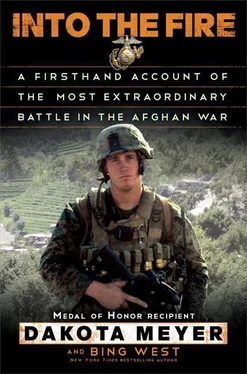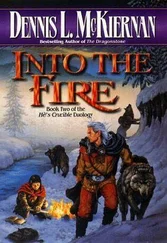Doc Layton, our corpsman, would provide some basic medical care to the Afghans in the villages, but his primary job was to be ready in case any advisors or Afghan soldiers were wounded.
I had a job, too: Lt. Johnson put me in charge of tactics, operations, and weapons training. Before each patrol, I approved the Afghan scheme of maneuver, inspected the radios and guns, coordinated fire support, and planned an emergency escape route. This was far easier than planning the sniper missions I had been trained for. I also trained the Askars (Afgahan soldiers) on their M-16 rifles. Some tried to shoot well, and some didn’t care. I concentrated on getting across the three basics: take aimed shots and conserve your ammunition—don’t fire all over the place in a panic; watch your flanks; listen to your officers. In the middle of a hot shootout, those rules will usually save your life.
On some Marine advisor teams, and all Special Forces teams, everyone is on a first-name basis, regardless of rank. Having the maturity not to overstep your limits is assumed. I didn’t call Lt. Johnson by his first name, but we got along well and I rarely called him “sir.” He was the boss, and we both knew it.
Aaron, on the other hand, kept a military distance from me. He was a by-the-book staff NCO. Because Lt. Johnson and I had trained together, he may have thought I was a teacher’s pet to Lt. Johnson, and it griped him a little.
“We live in the same hooch, Corporal Meyer,” he said when I slipped and got too casual, “but don’t forget to address me as Staff Sergeant.”
“Roger that, Staff Sergeant.” I didn’t mind that.
“Soon to be Gunnery Sergeant, by the way,” he added, smiling. He was excited to make that promotion.
Down at Joyce, Maj. Kevin Williams concentrated on staff matters. He was quiet and pleasant, different from the brusque, hands-on type of commanding officer I knew from the infantry. He let Lt. Johnson manage our team.
Monti, like every U.S. outpost on the frontier, was following the Pentagon’s official counterinsurgency strategy. The general idea was to make friends with the villagers, provide them security, give out project money, and build relationships with the local officials. The theory was that when the tribes realized their government was guarding them and giving them things like American-funded generators, they would tell their young men not to join the Taliban. All of us advisors wanted to believe that, but both the American and Afghan soldiers warned us never to assume the villagers were on our side. The Afghans have a saying: you can rent an Afghan but you can never buy one. Meaning they are going to support whoever gives them the most “rent,” or money. That was apparent to us within the first week.
There were about forty villages in our area, and the Americans and Afghans at Monti sent out about ten patrols a week, each one planned as carefully as a beer run and executed like one, too. We didn’t go out to search and destroy the enemy, although the Afghan soldiers knew which valleys were hostile. We didn’t make arrests or bring local police with us because the Askars and the villagers disliked them. The villagers didn’t like the Taliban either, but the math didn’t add up: ten patrols a week couldn’t protect forty villages.
The four of us settled into a routine of patrolling five days a week. The Afghan company commander would pick out a village and we’d rehearse how to make the approach and what to do when we got there. Before leaving we’d check weapons, double-check the operations orders, and test our radio frequencies with the Dog Company op center.
Doc Layton prepared medical supplies to give to the villagers, and Johnson and Staff Sgt. Kenefick rotated as the senior advisor to the Afghans. I manned the turret, alternating between Humvees with .50-caliber machine guns and the Mark 19s with their 40-millimeter guns. The 40-millimeter is a small automatic cannon; its explosive shell, weighing almost one pound, can take apart a cement building.
The Askars climbed into the backs of their Ford Ranger pickups, and we’d leave through the Monti’s front gate with about four vehicles. As we drove along, sometimes we’d take potshots from a side valley, and the Askars would pay no attention. Other times, their Rangers skidded to a stop, and we’d pile out and scope the hills for targets we usually couldn’t find. On most patrols, we eventually reached a hamlet of ten to forty mud-and-timber houses perched on a hillside, looking one mudslide away from oblivion.
We’d park the trucks and walk up steep, rocky paths where the vehicles couldn’t go. The Askars would amble along, not expecting trouble, their weapons dangling casually. We four Americans, of course, were looking everywhere, our fingers beside our triggers and our guns pointing forward—I would have a heavy-duty machine gun at my side. About half of our Afghans were Tajiks from the north who didn’t speak the language of the Pashtuns in Kunar. The others were from other tribes, including some from Kunar, though no Afghan soldier in our unit was from the local district. That would put his family at risk, as the Taliban considered Afghan soldiers to be traitors.
Once inside the village, we’d set out sentries and sit down with the elders for a “key leader engagement” over a few cups of hot green tea.
The ritual was predictable:
Lt. Rhula (the Afghan company commander): “Your government wishes to protect you from the dushmen.”
The Askars called their enemy dushmen, meaning thugs and bandits. The villagers called them Taliban, but never dushmen. No one called them mujahideen, or holy warriors.
Gray-bearded Elder: “You say this every time you come, but you give us nothing. The last group of Americans promised us a generator. Where is it?”
Lt. Johnson: “We are simple soldiers, like Lt. Rhula. You must speak with the PRT [provincial reconstruction team] about the generator.”
Elder: “Americans do nothing but promise.”
Lt. Rhula: “Have you seen any strangers?”
Elder: “Taliban sometimes come by. They don’t tell us anything. The next village is bad, not us.”
It was always the other village. We visited a village for a few hours; the Taliban came and went as they pleased.
Some villages were genuinely friendly, some standoffish. You’d rarely see young men, and any woman would dash inside immediately. The villagers and Askars were polite to one another, but rarely did I see them laugh together or talk in a friendly manner. The Askars looked bored and the villagers looked resigned to casual searches of their compounds while the Afghan officer and the elders sipped tea and we advisors checked off another “key leader engagement.”
When we walked into some hamlets, however, you could feel something was wrong. When kids threw rocks at you, you knew what the parents were telling them. Sometimes the Askars grabbed the kids’ soccer balls and sliced them apart. This didn’t win hearts and minds, but it did stop the rocks. Whenever the elders hurried through the ceremonial tea, though, I’d watch the Askars. When any soldier senses danger, he crouches down a few inches to make himself less of a target. When the Askars did that, I went on full alert.
Hafez was our lead interpreter and, we quickly learned, our best warning system. A thirty-seven-year-old sergeant major retired from the Afghan Army, Hafez had served in Kunar for three years with advisor teams. The Afghan soldiers distrusted him because he refused to support their never-ending schemes to skim from the Americans.
Hafez was a man without a country. His request for a visa to the States went unanswered because he lacked a high-level American sponsor. Yet his loyalty to Americans was unbounded. He taught us how to act with the elders, provided tips before meetings, and pointed out when the Askars were taking advantage of us or when the villagers were lying. Hafez became the unofficial fifth member of our team. Inside a hamlet, if he shook his head at us, we knew it was time to forget the tea and get out.
Читать дальше












